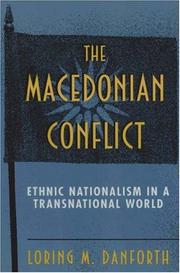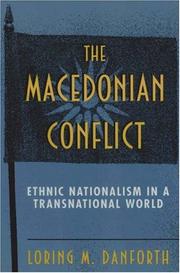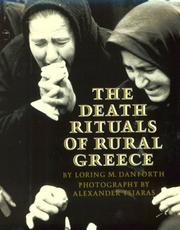| Listing 1 - 10 of 14 | << page >> |
Sort by
|

ISBN: 0691043574 Year: 1995 Publisher: Princeton (N.J.) : Princeton university press,
Abstract | Keywords | Export | Availability | Bookmark
 Loading...
Loading...Choose an application
- Reference Manager
- EndNote
- RefWorks (Direct export to RefWorks)
Macedonians --- Nationalism --- Nationalisme --- Greece --- Macedonia --- Grèce --- Macédoine --- Ethnic relations --- Foreign relations --- Relations interethniques --- #SBIB:328H271 --- #SBIB:321H81 --- #SBIB:39A6 --- #SBIB:39A72 --- Greeks --- -Immigrants --- -Macedonians --- -Nationalism --- -Consciousness, National --- Identity, National --- National consciousness --- National identity --- International relations --- Patriotism --- Political science --- Autonomy and independence movements --- Internationalism --- Political messianism --- Ethnology --- Slavs, Southern --- Emigrants --- Foreign-born population --- Foreign population --- Foreigners --- Migrants --- Persons --- Aliens --- Mediterranean race --- Instellingen en beleid: Balkanstaten: Roemenië, Bulgarije, Ex-Joegoslavië, Albanië e.a. --- Westerse politieke en sociale theorieën vanaf de 19e eeuw : nationalisme, corporatisme, fascisme, nationaal socialisme, rechtsextremisme, populisme --- Etniciteit / Migratiebeleid en -problemen --- Etnografie: Europa --- Australia --- -Macedonia --- -Macedon --- Ethnic relations. --- Name --- Immigrants --- -Instellingen en beleid: Balkanstaten: Roemenië, Bulgarije, Ex-Joegoslavië, Albanië e.a. --- -Ethnic relations. --- Grèce --- Macédoine --- Instellingen en beleid: Balkanstaten: Roemenië, Bulgarije, Ex-Joegoslavië, Albanië e.a --- Macedon --- Makedhonia --- Makedonia --- Makedoniya --- Makedonja --- Name. --- Macedonia - Ethnic relations. --- Macedonia - Name. --- North Macedonians --- al-Yūnān --- Ancient Greece --- Ellada --- Ellas --- Ellēnikē Dēmokratia --- Elliniki Dimokratia --- Grčija --- Grecia --- Gret︠s︡ii︠a︡ --- Griechenland --- Hellada --- Hellas --- Hellenic Republic --- Hellēnikē Dēmokratia --- Kingdom of Greece --- République hellénique --- Royaume de Grèce --- Vasileion tēs Hellados --- Xila --- Yaṿan --- Yūnān --- Ελληνική Δημοκρατία --- Ελλάς --- Ελλάδα --- Греция --- اليونان --- يونان --- 希腊

ISBN: 1400884365 9781400884360 0691028532 0691094543 9780691094540 9780691028538 Year: 1989 Publisher: Princeton (N.J.) : Princeton university press,
Abstract | Keywords | Export | Availability | Bookmark
 Loading...
Loading...Choose an application
- Reference Manager
- EndNote
- RefWorks (Direct export to RefWorks)
"If the Saint calls you, if you have an open road, then you don't feel the fire as if it were your enemy," says one of the participants in the Anastenaria. This compelling work evokes and contrasts two forms of firewalking and religious healing: first, the Anastenaria, a northern Greek ritual in which people who are possessed by Saint Constantine dance dramatically over red-hot coals, and, second, American firewalking, one of the more spectacular activities of New Age psychology. Loring Danforth not only analyzes these rituals in light of the most recent work in medical and symbolic anthropology but also describes in detail the lives of individual firewalkers, involving the reader personally in their experiences: he views ritual therapy as a process of transformation and empowerment through which people are metaphorically moved from a state of illness to a state of health. Danforth shows that the Anastenaria and the songs accompanying it allow people to express and resolve conflict-laden family relationships that may lead to certain kinds of illnesses. He also demonstrates how women use the ritual to gain a sense of power and control over their lives without actually challenging the ideology of male dominance that pervades Greek culture. Comparing the Anastenaria with American firewalking, Danforth includes a gripping account of his own participation in a firewalk in rural Maine. Finally he examines the place of anthropology in a postmodern world in which the boundaries between cultures are becoming increasingly blurred.
Spiritual healing --- Fire walking --- Divine healing --- Faith-cure --- Faith healing --- Spiritual therapies --- Healing --- Miracles --- Firewalking --- Walking on fire --- Fire --- Religious aspects --- United States --- Greece --- Religious life and customs.
Book
ISBN: 0520964519 9780520964518 9780520290280 0520290283 9780520290273 0520290275 Year: 2016 Publisher: Oakland, California
Abstract | Keywords | Export | Availability | Bookmark
 Loading...
Loading...Choose an application
- Reference Manager
- EndNote
- RefWorks (Direct export to RefWorks)
For many people, the Kingdom of Saudi Arabia evokes images of deserts, camels, and oil, along with rich sheikh in white robes, oppressed women in black veils, and terrorists. But when Loring Danforth traveled through the country in 2012, he found a world much more complex and inspiring than he could have ever imagined. With vivid descriptions and moving personal narratives, Danforth takes us across the Kingdom, from the headquarters of Saudi Aramco, the country's national oil company on the Persian Gulf, to the centuries-old city of Jeddah on the Red Sea coast with its population of undocumented immigrants from all over the Muslim world. He presents detailed portraits of a young woman jailed for protesting the ban on women driving, a Sufi scholar encouraging Muslims and Christians to struggle together with love to know God, and an artist citing the Quran and using metal gears and chains to celebrate the diversity of the pilgrims who come to Mecca.Crossing the Kingdom paints a lucid portrait of contemporary Saudi culture and the lives of individuals, who like us all grapple with modernity at the dawn of the twenty-first century.
SOCIAL SCIENCE / Anthropology / Cultural & Social. --- Saudi Arabia --- Description and travel. --- 20th century. --- 21st century. --- ancient cities. --- ancient ruins. --- camel. --- contemporary. --- current affairs. --- desert. --- foreign country. --- immigrants. --- immigration. --- jeddah. --- kingdom. --- law and order. --- middle east. --- middle eastern culture. --- modern world. --- muslim world. --- muslim. --- natural resources. --- natural world. --- oil. --- oppressed women. --- persian gulf. --- personal narrative. --- prisons. --- protest. --- red sea. --- saudi arabia. --- saudi culture. --- social science. --- sufi. --- travel memoir. --- travel. --- traveler. --- true story. --- womens rights.

ISBN: 0691043566 0691043574 0691221715 Year: 1995 Publisher: New Jersey Princeton University Press
Abstract | Keywords | Export | Availability | Bookmark
 Loading...
Loading...Choose an application
- Reference Manager
- EndNote
- RefWorks (Direct export to RefWorks)
Book
ISBN: 9780691221717 Year: 2021 Publisher: Princeton, NJ
Abstract | Keywords | Export | Availability | Bookmark
 Loading...
Loading...Choose an application
- Reference Manager
- EndNote
- RefWorks (Direct export to RefWorks)
Multi
ISBN: 9780691221717 Year: 2021 Publisher: Princeton, N.J. Princeton University Press
Abstract | Keywords | Export | Availability | Bookmark
 Loading...
Loading...Choose an application
- Reference Manager
- EndNote
- RefWorks (Direct export to RefWorks)
Digital
ISBN: 9781400884360 9780691028538 Year: 2016 Publisher: Princeton, N.J. Princeton University Press
Abstract | Keywords | Export | Availability | Bookmark
 Loading...
Loading...Choose an application
- Reference Manager
- EndNote
- RefWorks (Direct export to RefWorks)

ISBN: 0691000271 0691218196 0691031320 Year: 1982 Publisher: Princeton (N.J.) : Princeton university press,
Abstract | Keywords | Export | Availability | Bookmark
 Loading...
Loading...Choose an application
- Reference Manager
- EndNote
- RefWorks (Direct export to RefWorks)
This compelling text and dramatic photographic essay convey the emotional power of the death rituals of a small Greek village--the funeral, the singing of laments, the distribution of food, the daily visits to the graves, and especially the rite of exhumation. These rituals help Greek villagers face the universal paradox of mourning: how can the living sustain relationships with the dead and at the same time bring them to an end, in order to continue to live meaningfully as members of a community? That is the villagers' dilemma, and our own. Thirty-one moving photographs (reproduced in duotone to do justice to their great beauty) combine with vivid descriptions of the bereaved women of "Potamia" and with the words of the funeral laments to allow the reader an unusual emotional identification with the people of rural Greece as they struggle to integrate the experience of death into their daily lives. Loring M. Danforth's sensitive use of symbolic and structural analysis complements his discussion of the social context in which these rituals occur. He explores important themes in rural Greek life, such as the position of women, patterns of reciprocity and obligation, and the nature of social relations within the family.
#SBIB:39A10 --- #SBIB:39A72 --- Antropologie: religie, riten, magie, hekserij --- Etnografie: Europa --- Death --- Funeral rites and ceremonies --- Laments --- Social aspects --- History and criticism. --- Greece --- Rural conditions. --- Social life and customs. --- Complancha --- Lamentations --- Elegiac poetry --- Mourning customs --- Dying --- End of life --- Life --- Terminal care --- Terminally ill --- Thanatology --- History and criticism --- Philosophy --- Griechenland --- Grèce --- Hellas --- Yaṿan --- Vasileion tēs Hellados --- Hellēnikē Dēmokratia --- République hellénique --- Royaume de Grèce --- Kingdom of Greece --- Hellenic Republic --- Ancient Greece --- Ελλάδα --- Ellada --- Ελλάς --- Ellas --- Ελληνική Δημοκρατία --- Ellēnikē Dēmokratia --- Elliniki Dimokratia --- Grecia --- Grčija --- Hellada --- اليونان --- يونان --- al-Yūnān --- Yūnān --- 希腊 --- Xila --- Греция --- Gret︠s︡ii︠a︡ --- Alexiou, M. --- God. --- Haros. --- affines. --- binary oppositions. --- bitterness. --- black. --- burial. --- candles. --- clothes. --- confinement. --- corpse. --- decomposition. --- departure. --- earth. --- emergence. --- exhumation. --- family relationships. --- flowers. --- funeral service. --- graves. --- grief. --- harvest. --- immortality. --- incense. --- inheritance. --- kerchief. --- laments. --- lamps. --- liminality. --- marriage. --- memorial services. --- mother-in-law. --- naming system. --- obligations of living to dead. --- ommon-sense perspective. --- pain. --- paradise. --- religious perspective. --- Ritus i cerimònies fúnebres --- Mort --- Aspectes socials --- Vida social i costums.
Book
ISBN: 9780691218199 Year: 2021 Publisher: Princeton, NJ
Abstract | Keywords | Export | Availability | Bookmark
 Loading...
Loading...Choose an application
- Reference Manager
- EndNote
- RefWorks (Direct export to RefWorks)
Multi
ISBN: 9780691218199 Year: 2021 Publisher: Princeton, N.J. Princeton University Press
Abstract | Keywords | Export | Availability | Bookmark
 Loading...
Loading...Choose an application
- Reference Manager
- EndNote
- RefWorks (Direct export to RefWorks)
| Listing 1 - 10 of 14 | << page >> |
Sort by
|

 Search
Search Feedback
Feedback About UniCat
About UniCat  Help
Help News
News